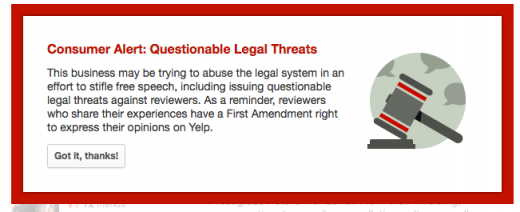Understanding Google My Business & Local Search
Yelp Promotes Free Speech But Only for Active Yelpers
I am a big supporter of free speech. I am though always a little suspicious when the likes of Yelp is its protector.
Yelp is “actively defending” reviewers right to free speech with a new wave of consumer alerts placed on business listings. Yelp nukes by their own admission 25% of all reviews. Thus it would seem that this right only applies if the reviewers are active Yelpers that have previously left 4 reviews and have 10 friends. Or some such metric that Yelp refers to as “established users”.
Several days ago the Yelp VP of Corp Comms & Public Affairs, Vince Sollitto made note that Yelp will be adding this Consumer alert to the Yelp listings for business that Yelp thinks is inappropriately suing or threatening to sue consumers over reviews. He noted:
Consumers don’t necessarily know that these threats are sometimes empty or meritless (and often both!), so the threat of legal action is enough to scare them into silence. We don’t think that’s right.
For example, earlier this year, a Texas couple was sued for posting an honest but critical review of Prestigious Pets, a pet-sitting service in Dallas. As a result, Yelp issued a Consumer Alert like the one above to serve as a warning for consumers. We’ve also placed Consumer Alerts on the business pages of Superior Moving & Storage in Pompano Beach, FL and Nima Dayani, DDS in New York City.
With all rights come responsibilities. We all know that the right to free speech is not absolute and learned as school children that we can’t expect to be protected if we yell “FIRE” in a crowded theater.
Yet Yelp seems to view their responsibility in this regard as non existent. While Yelp makes some efforts to keep spurious reviews out of the mix, they impose no requirements in the review process that a reviewer actually patronized the business they are reviewing.
And ironically they receive uncategorical blanket Federal protection against the use of their platform for libel. And are under no obligation to take libelous reviews down even if proven to be defamatory. This protection occurs under the Orwellian named Section 230 of the Communications Decency Act
Don’t get me wrong I think the right to speech is a powerful right that should be protected (although I am even more concerned about habeas corpus), I don’t think that businesses should engage in gagging or frivolous (operative word frivolous) lawsuits. But when Yelp starts touting themselves as the Protector of Free Speech as a marketing ploy I feel compelled to call bull shit. The “Right to Yelp Bill”? Gag me with a spoon.
© Copyright 2025 - MIKE BLUMENTHAL, ALL RIGHT RESERVED.

Comments
3 Comments
“They impose no requirements in the review process that a reviewer actually patronized the business they are reviewing.”
From what I can tell, even their content guidelines don’t require that you were a customer to leave a review. Their guidelines ask that you give your “firsthand consumer experience” about the “core of the consumer experience”, but really skirt around using the word “customer.” I’ve even flagged reviews that explicitly said they were not customers, and Yelp has refused to remove those: http://www.navolutions.com/blog/yelp-review-not-a-customer/
But re: the big issue, those consumer alerts are good business move for them, and as a consumer I’d absolutely want to know if a business takes their customers to court over Yelp reviews (so I could avoid them like the plague.)
I’m not the least bit surprised that they’re trying to position themselves as a protector of free speech, either – given all the fairly recent accusations of Google and Facebook manipulating searches for political reasons (http://searchengineland.com/google-crooked-hillary-251152 and http://gizmodo.com/former-facebook-workers-we-routinely-suppressed-conser-1775461006), it’s a relatively smart move by a fairly sleazy company.
@Joe I obviously see it as a transparently and blatantly self serving. So it’s only smart if consumers do not perceive the incredible hypocrisy involved. Given the reality it runs the risk of snaking back and biting them.
If only web referrals from Yelp didn’t convert at a 5x multiple of organic search.
Comments for this post are closed.